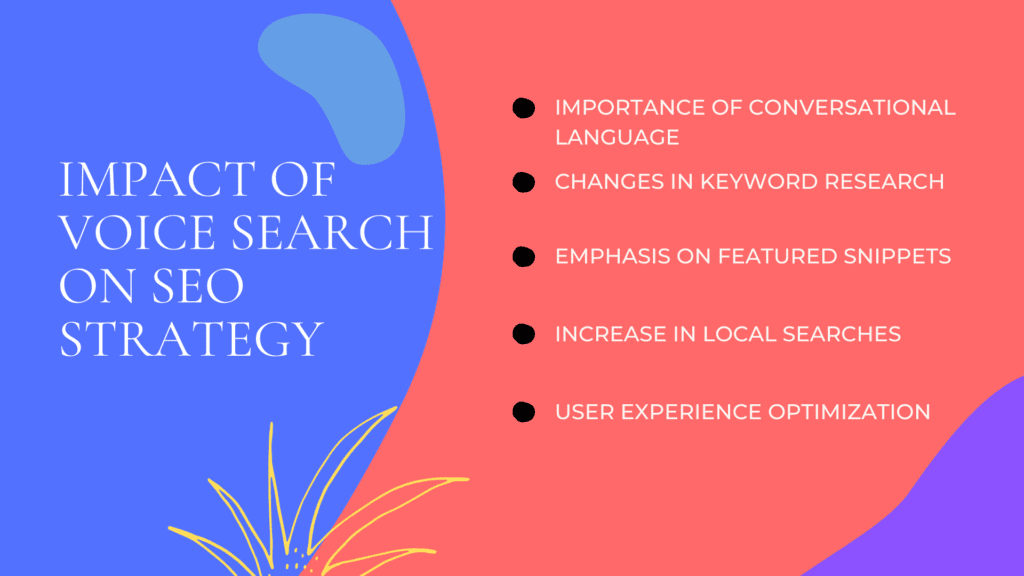Search Engine Optimization (SEO) is the practice of optimizing a website or web page to rank higher in search engine results pages (SERPs) organically. SEO is critical for businesses and websites to attract more traffic, improve brand visibility, and increase revenue.
The primary goal of SEO is to improve the quality and relevance of website content to search engine users, so search engines will rank the website higher in search results pages.
Voice Search and its growing importance
Voice search is an emerging technology that enables users to search the internet through voice commands instead of typing queries into a search engine. As the number of voice-enabled devices continues to increase, such as smart speakers and mobile phones, voice search is becoming more prevalent, and it is crucial for businesses to optimize their content for voice search.
Voice search optimization involves creating content that is optimized for natural language queries and using structured data to improve the chances of appearing in featured snippets, which are highly visible in voice search results.
Optimizing for voice search is essential because it improves the accessibility of your content to users who may have difficulty typing, and it can also increase the likelihood of appearing in voice search results, which can drive more traffic to your website.
Purpose of the blog
The purpose of this blog is to educate readers on the importance of SEO and voice search optimization. The blog aims to provide a clear understanding of the concepts of SEO and voice search, how they work, and why they are essential for businesses to succeed online.
By reading this blog, readers will gain insights into best practices for optimizing their websites and content for search engines and voice search, which can help increase website traffic, brand visibility, and revenue. The blog is suitable for business owners, marketers, and anyone interested in improving their online presence.
Voice Search

What Is Voice Search?
Voice search refers to the process of using a voice command to search for information on the internet. It involves speaking to a device, such as a smartphone or smart speaker, to access information, make a request, or give a command, rather than typing the search query into a search engine. Voice search technology has gained popularity in recent years due to its convenience, speed, and accuracy.
The evolution of Voice Search
Voice search technology has come a long way since it was first introduced in 2011 with the launch of Apple’s Siri. Since then, numerous voice-activated virtual assistants have been developed, including Amazon’s Alexa, Google Assistant, and Microsoft’s Cortana. These assistants use natural language processing and artificial intelligence to understand and respond to voice commands.
As voice search technology has evolved, so has its adoption. According to a study by Comscore, by 2020, 50% of all online searches were voice searches. This trend is expected to continue, with voice search predicted to account for 55% of all online searches by 2022.
How Voice Search is changing SEO
Voice search is changing the way people search for information on the internet, and this has significant implications for SEO. One of the main ways voice search is changing SEO is by emphasizing long-tail keywords and natural language queries.
With voice search, people tend to use longer queries and more conversational language, which means that websites and content creators need to optimize for these types of queries. This includes using natural language in website content, optimizing for long-tail keywords, and providing answers to questions that people may ask.
Another way voice search is changing SEO is by placing a greater emphasis on featured snippets. Featured snippets are concise summaries of answers that appear at the top of search engine results on pages in response to a search query. These snippets are highly visible in voice search results, and optimizing for them can increase the chances of appearing in voice search results.
Voice search is a rapidly growing trend that is changing the way people search for information on the internet. As a result, businesses and content creators need to adapt their SEO strategies to accommodate these changes and optimize their websites and content for voice search to remain competitive in the digital landscape.
Impact of Voice Search on SEO Strategy

Importance of conversational language
With the rise of voice search technology, conversational language has become increasingly important in the world of SEO. People tend to use more natural and conversational language when using voice search, rather than typing in short and specific keywords.
This means that businesses and content creators must adapt their SEO strategies to optimize for long-tail keywords and phrases that mimic natural language queries. By incorporating conversational language into their content, businesses can improve their chances of appearing in voice search results and reach a broader audience.
Changes in keyword research
With the shift towards conversational language, traditional keyword research methods are becoming less effective. To keep up with the changes in voice search, businesses must focus on identifying long-tail and conversational keywords that align with their target audience’s search habits. This requires an understanding of user intent and how people are using voice search to find information. By conducting thorough keyword research, businesses can optimize their content for the types of queries that people are most likely to use in voice searches.
Emphasis on featured snippets
Featured snippets are brief, informative answers that appear at the top of search engine results on pages in response to a search query. As voice search continues to grow, featured snippets are becoming more important, as they are often read aloud by virtual assistants in response to voice commands.
To optimize for voice search, businesses must focus on providing high-quality, informative content that is structured to appear in featured snippets. By doing so, businesses can improve their visibility in voice search results and drive more traffic to their website.
Increase in local searches
Voice search has also led to an increase in local searches, as people often use voice commands to find nearby businesses and services. To optimize for local search, businesses must ensure that their website and content are optimized for local SEO. This includes creating a Google My Business listing, using local keywords, and providing accurate and up-to-date information about their business’s location, hours, and services.
User experience optimization
Finally, as with all aspects of SEO, user experience is key when optimizing for voice search. Websites must be fast, mobile-friendly, and easy to navigate to provide a positive user experience.
Additionally, businesses must focus on providing high-quality, informative content that is optimized for voice search and provides value to the user. By doing so, businesses can improve their chances of appearing in voice search results and provide a positive user experience that keeps users coming back.
Voice search is a growing trend that is changing the way people search for information on the internet. Businesses that want to remain competitive in this digital landscape must adapt their SEO strategies to optimize for voice search.
By focusing on conversational language, identifying long-tail keywords, optimizing for featured snippets, emphasizing local search, and prioritizing user experience, businesses can improve their visibility in voice search results and drive more traffic to their website.
Importance of Structured Data

Explanation of Structured Data
Structured data, also known as schema markup, is a standardized format for providing information about a webpage to search engines. It uses a specific vocabulary to label and organize the content on a website, making it easier for search engines to understand and present in search results. Structured data can be used to provide information about a wide range of content, including products, recipes, events, and more.
Significance of Structured Data in Voice Search
Structured data plays a significant role in optimizing for voice search. When a user makes a voice search, virtual assistants use structured data to understand the content of a webpage and provide relevant answers to the user’s query. By using structured data, businesses can provide search engines with more detailed information about their content, which can improve their chances of appearing in voice search results.
For example, if a user asks their virtual assistant for the nearest pizza restaurant, the assistant will use structured data to search for pizza restaurants in the user’s local area. If a business has implemented structured data on its website, providing details such as its address, hours of operation, and menu, they are more likely to appear in voice search results for this query.
How to implement Structured Data
Implementing structured data on a website can seem daunting, but there are several tools available to make the process easier. The first step is to identify the type of content that needs to be marked up with structured data, such as products, recipes, or events. Once this is done, the business can use a tool like Google’s Structured Data Markup Helper to generate the necessary schema markup code.
Another option can be to use a plugin or extension, such as Yoast SEO or Schema Pro, to automate the process of implementing structured data. These tools make it easy to add schema markup to a website, even for those with little technical knowledge.
Structured data is a crucial component of optimizing for voice search. By providing search engines with detailed information about their content, businesses can improve their chances of appearing in voice search results and drive more traffic to their website. While implementing structured data may seem challenging at first, there are many tools available to make the process easier, and the benefits are well worth the effort.
Optimizing for Voice Search

Tips to Optimize for Voice Search
As voice search continues to grow in popularity, businesses must optimize their websites to appear in voice search results. Here are five tips to help businesses improve their voice search optimization:
Focus on long-tail keywords: Voice searches are often longer and more conversational than text-based searches. Therefore, businesses must focus on using long-tail keywords that match the phrases used in voice searches. Using natural language and questions in website content and meta descriptions can also help.
Create conversational content: Businesses should create content that answers common questions related to their industry or product. Content should be written in a conversational tone to match the way people speak when using voice search.
Improve website speed: Voice searches typically come from mobile devices, and users expect quick results. Therefore, businesses must ensure that their website is fast and responsive to improve the chances of appearing in voice search results.
Optimize for mobile: As mentioned earlier, voice searches mostly come from mobile devices. Therefore, businesses must optimize their website for mobile users. A responsive design, fast page load times, and easy navigation are essential for mobile optimization.
Create FAQ pages: Frequently Asked Questions (FAQ) pages are a great way to answer common questions related to a business’s industry or products. Businesses should create a dedicated FAQ page on their website and optimize it for voice search by using long-tail keywords and natural language.
Importance of tracking results
Once businesses have implemented these tips, it’s crucial to track the results to understand their effectiveness. Tracking results helps businesses identify areas that need improvement and adjust their optimization strategy accordingly.
Tracking can be done using tools such as Google Analytics and Google Search Console. These tools provide businesses with data on website traffic, keyword rankings, and search queries. They can also identify which pages are driving traffic and which are not.
Tracking results can help businesses determine which voice search optimization techniques are working and which are not. It also provides insights into how users are interacting with the website and what changes need to be made to improve their experience.
Optimizing for voice search is crucial for businesses to stay ahead of the curve. By focusing on long-tail keywords, creating conversational content, improving website speed, optimizing for mobile, and creating FAQ pages, businesses can improve their chances of appearing in voice search results. And, by tracking results, they can identify areas that need improvement and adjust their strategy accordingly.
Conclusion
Recap of the impact of Voice Search on SEO
Voice search has significantly impacted the world of SEO, forcing businesses to adapt to this new trend. Traditional keyword research and optimization techniques are no longer sufficient. Voice searches are more conversational and longer than typed searches, which has led to changes in how businesses optimize their websites. The use of long-tail keywords, conversational content, and optimization for mobile devices has become more important than ever.
Voice search has also impacted search engine results pages (SERPs). Google now provides featured snippets that give direct answers to voice search queries. Therefore, businesses must focus on optimizing their content to appear in featured snippets, as this increases their visibility in voice search results.
Future of SEO and Voice Search
The future of SEO is closely linked to the future of voice search. As voice assistants become more advanced, users will likely rely on them more frequently to perform tasks beyond just searching. Voice assistants will be integrated into more devices, including cars, appliances, and wearables, which will further increase the importance of voice search optimization.
The integration of artificial intelligence (AI) and natural language processing (NLP) will also change the way businesses approach voice search optimization. AI will allow search engines to better understand the context and intent behind voice searches, which will require businesses to create even more targeted content that answers specific questions related to their industry or product.
Final thoughts
Voice search is not a passing trend, and businesses must continue to optimize their websites to stay relevant in search results. Businesses must keep up with the latest trends and techniques in voice search optimization to improve their chances of appearing in search results.
By focusing on long-tail keywords, creating conversational content, optimizing for mobile, and tracking results, businesses can stay ahead of the curve in the world of voice search optimization. The future of SEO is exciting, and businesses that embrace these changes will be well-positioned to succeed.
Read More: The Top 5 SEO Mistakes That Are Killing Your Website’s Ranking
FAQs Related To The Future Of SEO
What is voice search, and how does it differ from traditional search methods?
Voice search is a technology that allows users to perform search queries using their voice instead of typing keywords into a search engine. This technology differs from traditional search methods because it relies on natural language processing (NLP) and artificial intelligence (AI) to understand the context and intent behind user queries.
How has voice search already impacted SEO, and what changes have been made to adapt to it?
Voice search has already impacted SEO by changing the way businesses approach keyword research and optimization. Businesses must now focus on long-tail keywords and conversational language to better match the natural language used in voice searches. Additionally, featured snippets have become more important as they often provide direct answers to voice search queries.
What role do long-tail keywords play in optimizing for voice search, and how can businesses use them effectively?
Long-tail keywords play a crucial role in optimizing for voice searches because they better match the conversational language used in voice searches. Businesses can use long-tail keywords effectively by using tools like Google’s Keyword Planner to identify relevant phrases and incorporate them naturally into their content.
How can businesses optimize their content for featured snippets and increase their visibility in voice search results?
Businesses can optimize their content for featured snippets by creating content that directly answers frequently asked questions related to their industry or product. This can include creating a dedicated FAQ page or incorporating question-and-answer sections into existing content.
What impact will the integration of AI and NLP have on the future of voice search and SEO?
The integration of AI and NLP will likely have a significant impact on the future of voice search and SEO. AI will allow search engines to better understand the context and intent behind user queries, leading to more accurate search results. This will require businesses to create even more targeted and specific content to match the evolving needs of voice search users.
How can businesses optimize for local search in a world increasingly dominated by voice search?
Businesses can optimize for local search by ensuring their website includes accurate and up-to-date information about their physical location, hours of operation, and other relevant details. Additionally, creating location-specific content and obtaining reviews from customers can help improve their visibility in local search results.
What role will user experience (UX) play in optimizing for voice search, and how can businesses improve their UX for voice search users?
UX will play an increasingly important role in optimizing for voice search as users expect a seamless experience when interacting with voice assistants. Businesses can improve their UX for voice search users by ensuring their website is mobile-friendly, has a fast load time, and includes easy-to-use navigation and search functions.
How can businesses measure the effectiveness of their voice search optimization efforts, and what metrics should they track?
Businesses can measure the effectiveness of their voice search optimization efforts by tracking metrics such as organic traffic, click-through rates, and engagement metrics like time on site and bounce rates. Additionally, tracking keyword rankings and featured snippets can provide insights into the effectiveness of their SEO efforts.
What are some potential pitfalls businesses should avoid when optimizing for voice search?
Some potential pitfalls businesses should avoid when optimizing for voice search include using overly technical language or jargon, neglecting traditional SEO practices, and ignoring the importance of user experience. It is important for businesses to maintain a balance between optimizing for voice search and traditional search methods while also prioritizing a positive user experience.
How can businesses stay up-to-date on the latest trends and techniques in voice search optimization?
Businesses can stay up-to-date on the latest trends and techniques in voice search optimization by following industry thought leaders and publications, attending relevant conferences and events, and conducting regular research and analysis of their websites and competitors. Additionally, staying up-to-date on changes
Read More: How and Why to Optimize Your Website for Voice Search in 2022

















